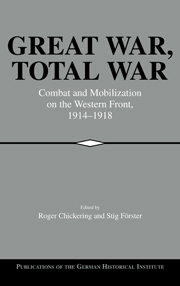Book contents
- Frontmatter
- Introduction
- PART ONE BASIC REFLECTIONS
- PART TWO THE CHANGING REALITIES OF WARFARE
- PART THREE WAR AGAINST NONCOMBATANTS
- PART FOUR POLITICIANS, SOLDIERS, AND THE PROBLEM OF UNLIMITED WARFARE
- 13 Poincaré, Clemenceau, and the Quest for Total Victory
- 14 Strategy and Unlimited Warfare in Germany
- 15 The Strategy of Unlimited Warfare?
- 16 French Strategy on the Western Front, 1914-1918
- 17 Strategy and Total War in the United States
- PART FIVE MOBILIZING ECONOMIES AND FINANCE FOR WAR
- PART SIX SOCIETIES MOBILIZED FOR WAR
- Index
15 - The Strategy of Unlimited Warfare?
Kitchener, Robertson, and Haig
Published online by Cambridge University Press: 05 January 2013
- Frontmatter
- Introduction
- PART ONE BASIC REFLECTIONS
- PART TWO THE CHANGING REALITIES OF WARFARE
- PART THREE WAR AGAINST NONCOMBATANTS
- PART FOUR POLITICIANS, SOLDIERS, AND THE PROBLEM OF UNLIMITED WARFARE
- 13 Poincaré, Clemenceau, and the Quest for Total Victory
- 14 Strategy and Unlimited Warfare in Germany
- 15 The Strategy of Unlimited Warfare?
- 16 French Strategy on the Western Front, 1914-1918
- 17 Strategy and Total War in the United States
- PART FIVE MOBILIZING ECONOMIES AND FINANCE FOR WAR
- PART SIX SOCIETIES MOBILIZED FOR WAR
- Index
Summary
This chapter examines the relationship between political aims and military strategy in Britain between 1914 and 1918 by exploring the ideas of the three soldiers who dominated the development of British military policy during that period. Lord Horatio Kitchener was the soldier-statesman who, as the secretary of state for war between August 1914 and June 1916, exercised a greater influence over the development of British strategic policy than any other single individual. Sir William Robertson, the quintessential staff officer, served as the chief of the imperial general staff (CIGS) between December 1915 and February 1918 and was the government s most powerful military adviser. And Sir Douglas Haig, the commander in chief of the British Expeditionary Force (BEF) in France from December 1915 until the end of the war, commanded the largest army Britain had ever put into the field. Despite Sir Henry Wilson's characterization of civil-military relations in Britain during the war as being a debate between “Frocks” and “Brasshats,” it is apparent on close examination that the leading Brasshats were by no means united. There were significant disagreements between them on the nature of the war on which Britain had embarked in August 1914, the political goals they were fighting to achieve, the means they wanted to use to achieve those goals, and the operational concepts they were willing to employ.
Until recently it was fashionable to regard Lord Kitchener as a great poster but as a man bereft of strategic ideas. The fact that he was drowned in June 1916 before he could write his memoirs and that his own papers, unlike those of Haig or Robertson, contained neither a personal diary nor extensive memoranda in which he explained his strategic conceptions in his own words, has not made the historian's task of reconstructing his ideas any easier. However, recent research has gone far to qualify this assessment. Of the three men whose careers and ideas are examined here, only Kitchener had previous experience of the strategic direction of major war. He had commanded the army that reconquered the Sudan in 1898 and had then been chief of staff and commander in chief in South Africa from 1900 to 1902. It was perhaps this experience, together with his reading of the histories of the American Civil War (1861-5) and Franco- Prussian War (1870-1), that gave him his peculiar insight into the nature of World War I from its outset.
- Type
- Chapter
- Information
- Great War, Total WarCombat and Mobilization on the Western Front, 1914–1918, pp. 281 - 296Publisher: Cambridge University PressPrint publication year: 2000



